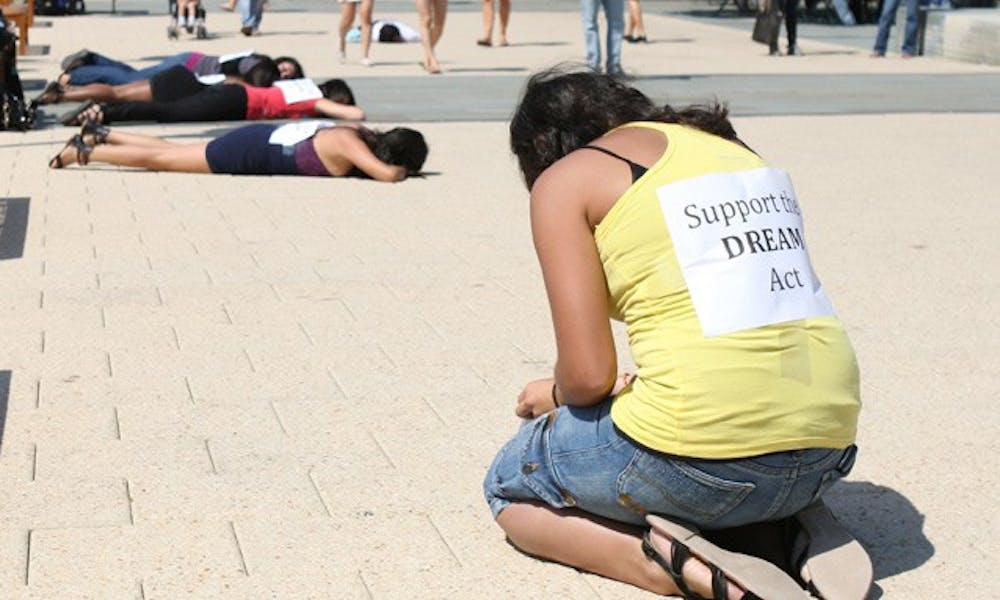After several postponements, the U.S. Senate is expected to vote this week on an act to increase educational opportunities for undocumented students.
The Development, Relief and Education for Alien Minors Act was created to help undocumented students gain legal status. Students that meet the bill’s requirements—such as having spent at least five years in the country before the legislation passes—would be eligible for conditional permanent residency after two years of college or military service.
In September, a filibuster led by the Republican Party derailed the passage of the DREAM Act that, along with the repeal of the “don’t ask, don’t tell” policy in the armed forces, was incorporated in the National Defense Authorization Act.
Since then, Democratic Majority Leader Harry Reid has proposed the DREAM Act as a stand-alone bill in order to garner more support.
White House Director of Intergovernmental Affairs Cecilia Munoz moderated a conference call Friday with Secretary of Commerce Gary Locke and administrators from University of California, Los Angeles; Miami-Dade College; and Regent University to advocate for the passage of the DREAM Act.
Munoz cited the economic benefits of the act, which she said would generate $2.3 billion in revenue over the next 10 years and help reduce the national deficit.
Locke said every year 65,000 undocumented residents graduate high school and have the potential to enter college or the work force.
“The American taxpayer has invested in them,” Locke said. “Unless we pass the DREAM Act, we’re going to keep throwing away this hard-earned investment.... Over the last 15 years, 25 percent of venture capitals were started by immigrants.”
Emilio Vicente, who applied to Duke last year but was not admitted, said he is one of the thousands of undocumented students who could have benefited from the passing of the act. Vicente said he believed applying as an international student put him at a disadvantage.
For students who are neither U.S. citizens nor legal permanent residents—and are therefore not eligible for government-based aid—the University does consider an applicant’s ability to pay tuition before making an admissions decision, Dean of Undergraduate Admissions Christoph Guttentag told The Chronicle in October.
“I was cross country captain, president of the Spanish club, did local community service, helped out at a summer school and translated for parent-teacher conferences,” Vicente said. “I feel I fit the profile and would’ve had a better chance if I wasn’t classified as an international.”
Some students expressed concerns that granting citizenship to undocumented residents could result in a “domino effect,” pressuring legislators to be given legal status to the students’ family members as well.
“It’s just so easy for people to get citizenship once one person does,” said freshman Yvette Vasquez.
Freshman Marcus Benning, a senator for Durham and Regional Affairs in Duke Student Government, said he supports the act if certain criteria are met.
“You could see a lot of those people who are not citizens of this country come simply because they want to capitalize on the DREAM Act,” Benning said. “If Congress were to pass this law, they would have to create stricter border immigration laws to ensure that we don’t have this problem.”
Benning also noted that the opportunities would allow undocumented immigrants to contribute to the United States and benefit the nation.
Junior Michelle Villegas, a member of Duke Students for Humane Borders, said she believes advocates for the act should take action.
“We call as many of our [state] senators as possible and leave voice messages saying we support the DREAM Act, pass out information on the plaza and have e-mails going out all the time,” Villegas said. “We’re doing as much as possible to support it.”
Senior Christine Contreras, also a member of DSHB, said she has no idea whether or not the Act will get passed this week.
“I’ve done as much as I can, and now it’s in the hands of our representatives,” Contreras said. “We’ll definitely advocate for it if it doesn’t pass. We’re not going to stop until it gets passed.”
Get The Chronicle straight to your inbox
Signup for our weekly newsletter. Cancel at any time.

